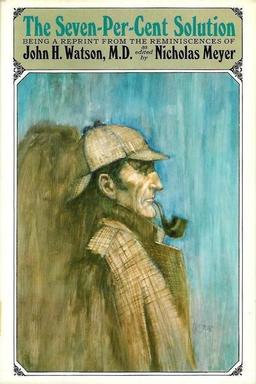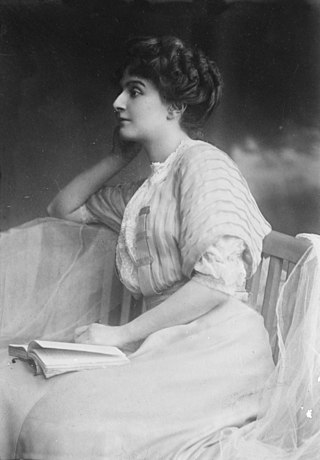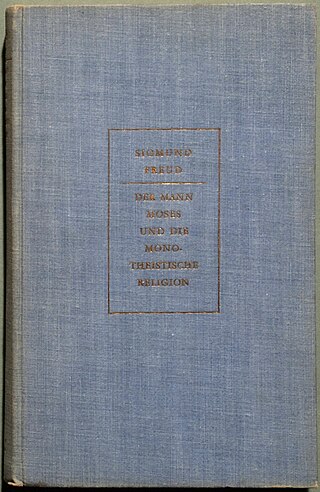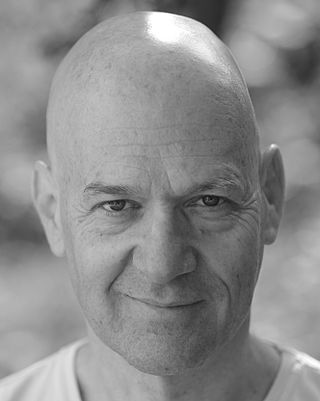
Sigmund Freud was an Austrian neurologist and the founder of psychoanalysis, a clinical method for evaluating and treating pathologies seen as originating from conflicts in the psyche, through dialogue between patient and psychoanalyst, and the distinctive theory of mind and human agency derived from it.

Emma Eckstein (1865–1924) was an Austrian author. She was "one of Sigmund Freud's most important patients and, for a short period of time around 1897, became a psychoanalyst herself". She has been described as "the first woman analyst", who became "both colleague and patient" for Freud. As analyst, while working mainly in the area of sexual and social hygiene, she also explored how 'daydreams, those "parasitic plants", invaded the life of young girls'.

In psychology, sublimation is a mature type of defense mechanism, in which socially unacceptable impulses or idealizations are transformed into socially acceptable actions or behavior, possibly resulting in a long-term conversion of the initial impulse.

The Seven-Per-Cent Solution: Being a Reprint from the Reminiscences of John H. Watson, M.D. is a 1974 novel by American writer Nicholas Meyer. It is written as a pastiche of a Sherlock Holmes adventure, and was made into a film of the same name in 1976.

Princess Marie Bonaparte, known as Princess George of Greece and Denmark upon her marriage, was a French author and psychoanalyst, closely linked with Sigmund Freud. Her wealth contributed to the popularity of psychoanalysis and enabled Freud's escape from Nazi Germany.
Depth psychology refers to the practice and research of the science of the unconscious, covering both psychoanalysis and psychology. It is also defined as the psychological theory that explores the relationship between the conscious and the unconscious, as well as the patterns and dynamics of motivation and the mind. The theories of Sigmund Freud, Carl Gustav Jung, and Alfred Adler are all considered its foundations.
Wilhelm Stekel was an Austrian physician and psychologist, who became one of Sigmund Freud's earliest followers, and was once described as "Freud's most distinguished pupil". According to Ernest Jones, "Stekel may be accorded the honour, together with Freud, of having founded the first psycho-analytic society". However, a phrase used by Freud in a letter to Stekel, "the Psychological Society founded by you", suggests that the initiative was entirely Stekel's. Jones also wrote of Stekel that he was "a naturally gifted psychologist with an unusual flair for detecting repressed material". Freud and Stekel later had a falling-out, with Freud announcing in November 1912 that "Stekel is going his own way". A letter from Freud to Stekel dated January 1924 indicates that the falling out was on interpersonal rather than theoretical grounds, and that at some point Freud developed a low opinion of his former associate. He wrote: "I...contradict your often repeated assertion that you were rejected by me on account of scientific differences. This sounds quite good in public but it doesn't correspond with the truth. It was exclusively your personal qualities—usually described as character and behavior—which made collaboration with you impossible for my friends and myself." Stekel's works are translated and published in many languages.

Studies on Hysteria is an 1895 book by Sigmund Freud, the founder of psychoanalysis, and the physician Josef Breuer. It consists of a joint introductory paper ; followed by five individual studies of hysterics – Breuer's famous case of Anna O., seminal for the development of psychoanalysis, and four more by Freud— including his evaluation of Emmy von N— and finishing with a theoretical essay by Breuer and a more practice-oriented one on therapy by Freud.

Moses and Monotheism is a 1939 book about the origins of monotheism written by Sigmund Freud, the founder of psychoanalysis. It is Freud's final original work and it was completed in the summer of 1939 when Freud was, effectively speaking, already "writing from his death-bed." It appeared in English translation the same year.

Frederick Campbell Crews was an American essayist and literary critic. Professor of English at the University of California, Berkeley, Crews was the author of numerous books, including The Tragedy of Manners: Moral Drama in the Later Novels of Henry James (1957), E. M. Forster: The Perils of Humanism (1962), and The Sins of the Fathers: Hawthorne's Psychological Themes (1966), a discussion of the work of Nathaniel Hawthorne. He received popular attention for The Pooh Perplex (1963), a book of satirical essays parodying various schools of literary criticism. Initially a proponent of psychoanalytic literary criticism, Crews later rejected psychoanalysis, becoming a critic of Sigmund Freud and his scientific and ethical standards. Crews was a prominent participant in the "Freud wars" of the 1980s and 1990s, a debate over the reputation, scholarship, and impact on the 20th century of Freud, who founded psychoanalysis. In 2017, he published Freud: The Making of an Illusion.

The End of the World News is a 1982 novel by British author Anthony Burgess.
Janine Burke is an Australian author, art historian, biographer, novelist and photographer. She also curates exhibitions of historical and contemporary art. She is Honorary Senior Fellow, Faculty of Fine Arts and Music, University of Melbourne. She was born in Melbourne in 1952.

Franklin C. "Cappy" Cappon was an American college football and college basketball player and coach. He played football and basketball at Phillips University and the University of Michigan and coached at Luther College (1923–1924), the University of Kansas (1926–1927), the University of Michigan, and Princeton University (1938–1961).

In neo-Freudian psychology, the Electra complex, as proposed by Swiss psychiatrist and psychoanalyst Carl Jung in his Theory of Psychoanalysis, is a girl's psychosexual competition with her mother for possession of her father. In the course of her psychosexual development, the complex is the girl's phallic stage; a boy's analogous experience is the Oedipus complex. The Electra complex occurs in the third—phallic stage —of five psychosexual development stages: the oral, the anal, the phallic, the latent, and the genital—in which the source of libido pleasure is in a different erogenous zone of the infant's body.

When Nietzsche Wept is a 1992 novel by Irvin D. Yalom, Emeritus Professor of Psychiatry at Stanford University, an existentialist, and psychotherapist. The book takes place mostly in Vienna, Austria, in the year 1882, and relates a fictional meeting between the doctor Josef Breuer and the German philosopher Friedrich Nietzsche. The novel is a review of the history of philosophy and psychoanalysis and some of the main personalities of the last decades of the 19th century, and revolves around the topic of "limerence".

Dror Green is a psychotherapist and author. He developed the method of Emotional Training, based on his concept of human nature. Although he was descended from a family that had lived in Israel for ten generations, he did not identify with Zionism, as he writes in the introduction to his book, ABC of Israeli Apartheid.

The Little Book is a New York Times best-selling novel by American writer Selden Edwards. Edwards began writing the novel in 1974, worked on it for over 30 years, and the manuscript was accepted by Dutton in 2007.

The Lost Prince is a sequel to the best-selling novel The Little Book by American writer Selden Edwards. It was published by Dutton in August 2012.

Freud's Sister is a novel written about the life of Sigmund Freud’s sister, Adolfina. Written by Goce Smilevski, it was originally published in Macedonia in 2011 and won the EU Prize for Literature in 2010 before it was published. It was subsequently translated by Christiana Kramer into English and published in the United States of America in 2012. This novel follows the life story of Adolfina from childhood until her death in a concentration camp in 1938 at Terezin.

Christine Downing is a scholar, educator, and author in the fields of mythology, religion, depth psychology, and feminist studies.
















